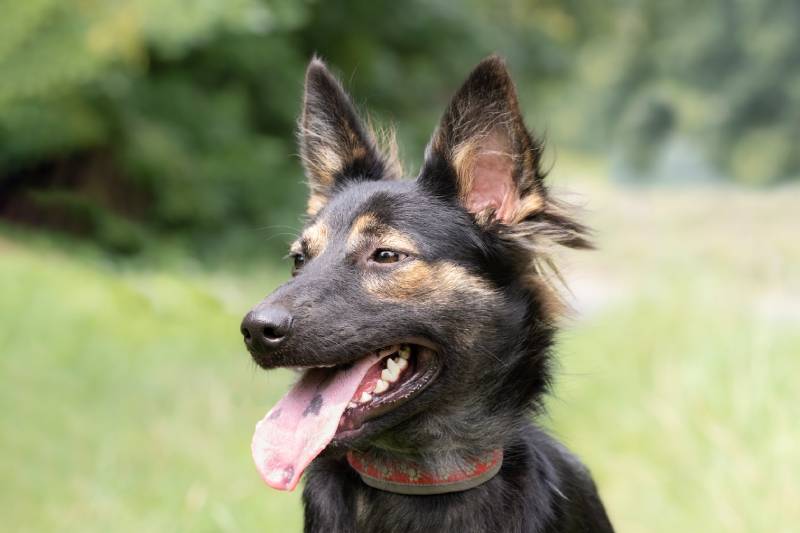- March 30, 2024
Why Do Dogs Have Black Spots on Their Tongues? 3 Vet-Verified Reasons



The information is current and up-to-date in accordance with the latest veterinarian research.
If you ever watch your dog panting or eating, you might see some scary looking spots on your dog’s tongue. Seeing black spots on the skin will usually raise eyebrows and concerns. Seeing black spots on your dog’s tongue might seem concerning as well, but most of the time, these spots are harmless. Dogs can develop black spots on their tongues for a number of reasons, with the most common one being natural pigmentation. Here are four reasons that your dog could have black spots on their tongue.

The 3 Reasons Why Dogs Have Black Spots on Their Tongues
1. Pigmentation
The most common reason that dogs can have black spots on their tongue is from pigmentation. Melanocytes are pigment producing cells that can congregate in areas on the tongue, creating flat, black or blue looking spots. Some dogs have entirely black or blue tongues. The amount of pigmentation in the tongue will vary from breed to breed and from dog to dog. These spots are nothing to be concerned about.
Black spots on the tongue are similar to birthmarks or moles. These are simply spots of pigmentation that often develop during puppyhood and remain into adulthood. If you notice these spots for weeks or months on end or have noticed them since the time your dog was young, they are likely one of these types of birthmarks.
Similarly, some dogs have black spots on their skin. If you shave some dogs, you will see large, dark spots on the skin. The spots on the skin are similar to spots on the tongue. These areas of pigmentation are generally harmless.

2. Staining
Another reason that dogs can have black spots on their tongue is from staining. Dogs can get stains in their mouth from a variety of different sources, including food, treats, and chewing. If your dog chews on a toy with blue coloring, they could end up with some coloration in their mouth, including on the tongue. Similarly, getting into foods like berries or candy can lead to spots on the tongue, not unlike children. If you haven’t noticed black spots on your dog’s tongue before, check to see what they have been eating or chewing to see if there is any connection. Black spots due to staining should go away on their own within a short time.
3. Cancer
Lastly, the most concerning reason for black spots on a dog’s tongue could be cancer. Dogs are not immune to developing tumors in their mouths. Signs that a black spot could be dangerous include raised areas, spots that change shape or size rapidly, or a foul odor in the mouth. These signs are concerning, and if you notice any of these in conjunction with your dog’s black spots, you should consult your veterinarian for guidance.


Are Black Spots on a Dog’s Tongue Concerning?
Not usually. In most cases, black spots are completely natural. The vast majority of black spots on your dog’s tongue are likely harmless and simply due to pigmentation. However, in some cases, these spots can be indicative of something more dangerous, especially if those spots change size or shape.
If the spots on your dog’s tongue look flat and remain consistent, they are likely natural pigmentation. However, if the spots appear raised or the shape, size or color changes, see your veterinarian.
Do All Dogs Have Black Spots on Their Tongues?
No. Not all dogs have black spots on their tongue, some dogs will have no discoloration on the tongue whatsoever. Other dogs have tongues that are mostly black or blue like the Chow Chow. Some dogs have spots. Every dog is different, which means that every tongue can be different as well.

Conclusion
Black spots on your dog’s tongue might seem scary at first, but most of the time, these spots are nothing to worry about. Many times, the spots on your dog’s tongue are simply natural pigmentation. In rarer cases, they can be caused by staining or cancer. If you notice black spots on your dog’s tongue, monitor them for size and shape and see your vet if anything changes.
Featured Image Credit: movchanzemtsova, Shutterstock
Tags
What do you think?
Related Articles

New Puppy Checklist: Gear You’ll Need for Your New Dog
Getting a new puppy is really exciting, but before you welcome them home, it’s important to prepare your space for them. Since puppies need a

How Big Do Mini Poodles Get? Vet Reviewed Average Weight & Growth Chart – Dogster
The information is current and up-to-date in accordance with the latest veterinarian research. Learn more » When you buy a Miniature Poodle, you might not

Can Police Dogs Smell Nicotine? Vet Verified Facts & Info – Dogster
The information is current and up-to-date in accordance with the latest veterinarian research. Learn more » While cigarette sales have been declining steadily for decades,

How Old Is 5 in Dog Years? Vet-Approved Guide to Each Size of Dog – Dogster
The information is current and up-to-date in accordance with the latest veterinarian research. Learn more » A common method for calculating a dog’s age is

